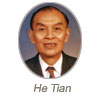AWARDEE OF MEDICAL SCIENCES AND MATERIA MEDICA PRIZE
CHEN SAIJUAN
Abstract
Prof. Chen Saijuan is engaged in the cytogenetic and molecular genetic research on cancer, in the field of which she has achieved an abundance of major achievements focusing on the discovery and elucidation of cellular and molecular mechanisms underlying the pathogenesis and the differentiation/apoptosis induction therapy in human leukemias. She is the first to clone the minor breakpoint cluster region (m-BCR) in the first intron of BCR gene which is rearranged in about half of Philadelphia chromosome positive acute leukemia and to demonstrate the Alu-mediated homologous recombination as the possible molecular mechanism for BCR-ABL rearrangement. Furthermore, she reported several new nonrandom chromosomal translocation of leukemia. She cloned, independently or with international collaboration, the fusion genes resulted from t(11;17)(q23;q21), t(7;11)(p15;p15), t(11;19)(q23;p13) and t(1;11)(q21;p15), among which t(11;17), a major variant chromosomal translocation occurring in acute promyelocytic leukemia, defines a new clinical syndrome as it is specific phenotype (retinoic acid-resistant). Then she cloned the promyelocytic leukemia zinc finger (PLZF) gene involved in chromosome 11 and so realized the first breakthrough in the field of cloning of new cancer-related genes. Her research group has set up the models of transgenic mouse as well as cellular transplantation of APL, which are considered as the ideal animal models for the research on the pathogenesis of APL and the mechanisms of differentiation/apoptosis therapy. She guided the work of isolation of genes regulated by retinoic acid during the APL cell differentiation, which has led to the discovery of a number of retinoic acid-induced genes (RIG) in Shanghai Institute of Hematology and she is one of the leaders for the research on the treatment of APL using arsenic trioxide. In addition, she is also devoted to the setting-up and development of technological platform for detection of cancer on the basis of molecular cytogenetics and molecular biology as strong technological support for national medical genomics. She has published more than 170 papers (including 75 papers on international journals), which have been cited more than 1500 times. Owing to her achievements, Prof. Chen has received a lot of major awards, including the Second Grade Award for National Natural Science.






